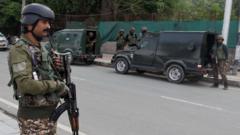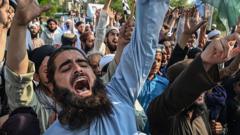A disturbing terrorist attack in Kashmir ignites decades-old tensions between India and Pakistan, with both sides gearing up for confrontation.
**Tensions Escalate Between India and Pakistan Over Terrorism Allegations**

**Tensions Escalate Between India and Pakistan Over Terrorism Allegations**
India's military actions against terrorist groups spark renewed conflict in Kashmir as Pakistan denies involvement.
May 10, 2025, 10:58 a.m. ET
In a significant escalation of violence between India and Pakistan, a recent terrorist attack on civilians in Kashmir has reignited decades-old tensions between the two countries. The assault, which left 26 civilians dead, has prompted India to take military action against groups it claims are supported by Pakistan.
The attack, perpetrated by a group called the Resistance Front, has been characterized by the Indian government as a blatant act of terrorism targeting Hindus in the region. Eyewitness accounts described a horrifying scene where families watched their loved ones being attacked in a scenic area of Kashmir. The Indian government alleges that this group is, in fact, a front for more extensive terrorist networks operating from Pakistani soil, a claim that has been firmly denied by Pakistan.
Experts identify two major groups that India has explicitly targeted in its military response: Lashkar-e-Taiba (LeT) and Jaish-e-Muhammad (JeM). LeT, founded in the 1980s, has been implicated in numerous high-profile attacks in India, including the 2008 Mumbai attacks that resulted in over 160 fatalities. Pakistan acknowledges the group's historical ties to violence in India but maintains that it has since been outlawed. Nonetheless, Indian officials argue that operational activities continue under different aliases, including the recently emerged Resistance Front.
While both countries navigate this complex geopolitical landscape, the international community watches closely, wary of any potential missteps that could further destabilize the region. As accusations fly and military postures strengthen, the question of how to achieve peace in Kashmir continues to elude all involved parties, leaving many to wonder what the future holds for this conflict-ridden area.
In a significant escalation of violence between India and Pakistan, a recent terrorist attack on civilians in Kashmir has reignited decades-old tensions between the two countries. The assault, which left 26 civilians dead, has prompted India to take military action against groups it claims are supported by Pakistan.
The attack, perpetrated by a group called the Resistance Front, has been characterized by the Indian government as a blatant act of terrorism targeting Hindus in the region. Eyewitness accounts described a horrifying scene where families watched their loved ones being attacked in a scenic area of Kashmir. The Indian government alleges that this group is, in fact, a front for more extensive terrorist networks operating from Pakistani soil, a claim that has been firmly denied by Pakistan.
Experts identify two major groups that India has explicitly targeted in its military response: Lashkar-e-Taiba (LeT) and Jaish-e-Muhammad (JeM). LeT, founded in the 1980s, has been implicated in numerous high-profile attacks in India, including the 2008 Mumbai attacks that resulted in over 160 fatalities. Pakistan acknowledges the group's historical ties to violence in India but maintains that it has since been outlawed. Nonetheless, Indian officials argue that operational activities continue under different aliases, including the recently emerged Resistance Front.
While both countries navigate this complex geopolitical landscape, the international community watches closely, wary of any potential missteps that could further destabilize the region. As accusations fly and military postures strengthen, the question of how to achieve peace in Kashmir continues to elude all involved parties, leaving many to wonder what the future holds for this conflict-ridden area.






















